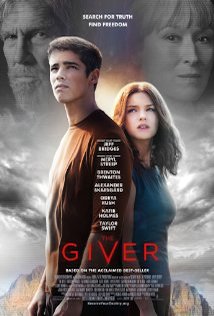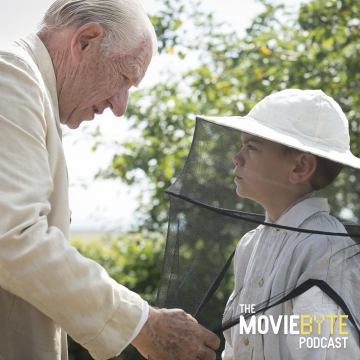
Books have a lot going for them when they become so successful that public schools make them required reads. The Giver is the first in four novels by Lois Lowry that have earned a place on such a list in America, Australia, and Canada. And only now, after 21 years of popular bookshelf demand, The Giver makes an appearance in cinemas.
Without a doubt, this social science fiction novel has its detractors. Some critics take it to lack “originality” and “literary merit.” Such concerns matter to the critics, as you well know. For what it’s worth, children and young adults usually enjoy the story, despite what the fault-finders call “occasional logical lapses.” Many a fictional story fails that test these days, wouldn’t you agree?
The most earnest critics attack the intent of the author, saying the story can’t withstand the pressure to make its point. The novel is forced to send a message the author would have it deliver. So subtlety isn’t The Giver’s strong suit.

Wait—before I continue, I have a confession to make: I didn’t know about The Giver before walking into the theater to watch this film. My wife, who read practically every book in the public library as a child, knew the book well and insisted we watch the movie adaption. I only agreed because The Giver stars Jeff Bridges and Meryl Streep, who are two of my favorite actors, and my wife so rarely shows interest in watching films at the cinema. (She is one of those people that prefers to watch movies in the comfort of her own home on a couch.)
Okay, so as I was saying, The Giver isn’t original or plausible by any stretch of the critical imagination. But that hasn’t stopped the book from winning several awards: the 1994 Newbery Medal and Regina Medal, the 1996 William Allen White Award, a Boston Globe-Horn Book Honor Book, and others.
What’s my point in mentioning all this? The movie, more so than other young adult fiction, deserves to have a movie adaptation. I think that, thanks to its acclaim and readership, the movie was made by the fans that appreciate The Giver’s finer qualities. And because it was produced with respect to the themes, the material of the novel was faithfully translated to film. Based on what readers have told me, the movie is one of the more consistent book-to-film adaptations. Staff of The Washington Post (their review):
The Newbery Medal young adult novel written by Lois Lowry was published in 1993 and sold more than 10 million copies. Actor/co-producer Jeff Bridges said it took him two decades to release the film, because it needed careful editing, financing and courage as the book was forbidden in some places for describing euthanasia. The book was so controversial that the movie producers decided to leave out a dark line related to newborns being killed, Emily Yahr reported.
Yes, The Giver addresses some very serious problems. And yet, it’s “innocent” enough that it’s accessible to middle school students.
So, without further ado, let me tell you about The Giver film.

Dystopian Utopia, an Old Man, and a Boy Named Jonas
The year is 2048 (but it could be at any time in the distant future). Jonas, Fiona, and Asher (played by Brenton Thwaites, Odeya Rush, and Cameron Monaghan) are three best friends that are about to graduate from high school. As they live in a utopian society—free from emotions, pain, and differences of choice—the young adults are more than a little eager to learn what careers the elders of the Community have in store for them. All they have ever known was that life has been perfected by the systems of their society. (All memories before the Community was founded have been erased.)
During their graduation ceremonies, Jonas is told that he will be trained as the next Receiver of Memory: a person who’s taught everything about life before the Community took shape. Jonas must advise the Chief Elders on the major decisions of their society, as they are unaware of anything that happened before the Community came into being. It’s an exclusive role that bears the weight of the world’s dark past.
“The Giver” is the retiring Receiver of Memory (played by Jeff Bridges). Over the coming months, the old man gives Jonas special knowledge about Earth elsewhere: animals that the Community has never seen, sleigh rides, festive culture celebrations around the world, noble advancements in distant places… And little by little, Jonas also learns about suffering, death, war, and the immoral artifice that makes the Community seemingly prosper. The Giver makes sure to introduce Jonas to emotions as well, as they help the young man form strong opinions about good and evil—wisdom versus folly.
Some very significant grievances of the Community shake Jonas to the core of his being. He decides that he cannot standby while innocent people are unwittingly harmed (by problems I won’t spoil for you).
(Spoilers in this paragraph) The Giver and The Receiver—Jonas—plot together to overthrow the Community: to give back to the people the knowledge of good and evil. They hope that when the Community gets all of the facts, and is re-introduced to human emotions, that the society will reverse its perfected corruption.

The Film Quality & Message
The Giver has what it takes to hold your attention and earn star cred in the Science Fiction category. Visual and special effects are so rich that I can’t tell you where the locations of the film came from, or how props were designed. The world building pulled me into the story very quickly.
The set dressing, costumes, technology, architecture and even the landscaping of the Community are authentic. It looked like this was a literal place somewhere in the world they filmed on location. Even though the town is set on a mountain peak above the clouds, the feel of their culture has a full measure of completeness. And I didn’t mind when the film borrowed visual concepts from other films. It was more complimentary than unlikable creative forgery.
Something you can’t miss is the use of black and white (the absence of color in various sequences throughout the film). Although it seems forced, it didn’t take away from the narrative. I know that many people despise black and white, but when monochrome is used effectively, like in The Giver, it becomes more than style for style’s sake. It helps to see the world of the Community through the eyes of its citizens. Since they don’t see colors, the audience doesn’t either.
As for the themes that make The Giver special among children’s fiction, I only want to show my support. The message is powerful, in spite of the story’s weaknesses. In keeping with the intended audience, The Giver shouldn’t be as dark, cynical, or disturbing as other dystopian films, like Equilibrium for instance.
For this reason, some will say the movie only musters superficial substance, but I don’t think this is true. Even though movie watchers will find the shallow depths of the Community and its characters stifling to the heart and soul of the story. The film is “mild,” and that’s not necessarily a bad thing because it’s accessible to young audiences. I don’t think the film needs to plunge the depths of human depravity and angst to feel true to life for children.
And we don’t need one more film that racks up explosions and high octane action sequences just for the heck of it. There aren’t ninjas, Jedis, spies, mutants, or super heroes in The Giver, and that’s refreshing.

No Dystopia is Perfect
When you take on a familiar concept, its easy to let down picky audiences. The Giver is familiar to us for its genre ploys, which you have seen in other films and TV shows. For what its worth, the familiarity didn’t take enjoyment out of the watching experience for me.
So rather than pick on the movie’s “sameness,” I’ll analyze what I wish the movie could have done better to produce a more entertaining film stuck within the limits of the source material.
Chief Elder: Meryl Streep
As difficult as it is to admit, because I really like Meryl Streep, I didn’t like her in the role of Chief Elder. I think she didn’t have the right look or behavior. The story uses her to be the focal point of tyranny in the leadership of the Community. Regrettably, she doesn’t sell genuine villainy.
Besides the weaknesses of the character, Meryl didn’t add much to the value of the film in her performance. For clarification, I want to compare her character to Donald Sutherland’s President Snow in The Hunger Games saga). Between the two villain’s deliveries, President Snow is the champion of evil overlords, and Donald’s is a better performance.
Disappointing Memories
The visual memories The Giver himself shares with Jonas make their point: they are reflections on the good throughout the cultures of our present age. There is also glimpses of corruption, war, the beauty of creation, and the glory of man’s ingenuity outside of the Community (not necessarily in that order).
So we can see the memories Jonas’ collects, there are various clips of animals, cities, the wild… and other flora and fauna. The visuals were each isolated incidents from the distant past before the founding of the Community. But despite the ability of the film’s visuals to send a clear message, I don’t think the stock video footage that was used in The Giver was impactful.
I didn’t emotionally connect with the memories and I ultimately felt these memories weren’t enough motivation to give Jonas the urge to save his people at any cost. Memories alone don’t make people noble. The memories Jonas receives would just as well intimidate and induce incessant worry in a young man. He might as well have developed post-traumatic stress disorder. That would have been a natural happenstance.
Jonas Figures it All Out the First Time
Lastly, a failure of the story, and thus the movie, is to make a believable solution for the Community’s problems. The difficult suspension of disbelief is the solutions that Jonas imagines will right all the wrongs.
In order to unlock the memories and give the Community their God-given emotions, he figures he should cross the border on the outer reaches of the Community’s land to reset everything that controls the psyche of the brainwashed citizens. Even The Giver thinks Jonas’ might be right when there really isn’t evidence to back up Jonas’ theory. I didn’t buy it, because it’s a noticeably weak solution.
But the story concludes that Jonas was right, no matter how unlikely. So… [sigh] like some of the critics say, The Giver has “occasional logical lapses” that I think would have been avoidable had Lois Lowry wrote the story differently.

The Bottom Line
I give The Giver four stars out of five because Phillip Noyce’s film is faithful to the novel: a story that resonates with a wide audience. It has influenced dystopian fiction at large, and I can see why.
While you might say the movie is a watered-down version of Equilibrium, it communicates why social utopia wouldn’t work. From the richness of good culture and a healthy use of human emotion comes humanity and civilization-building. For that, The Giver is successful and edifying.


